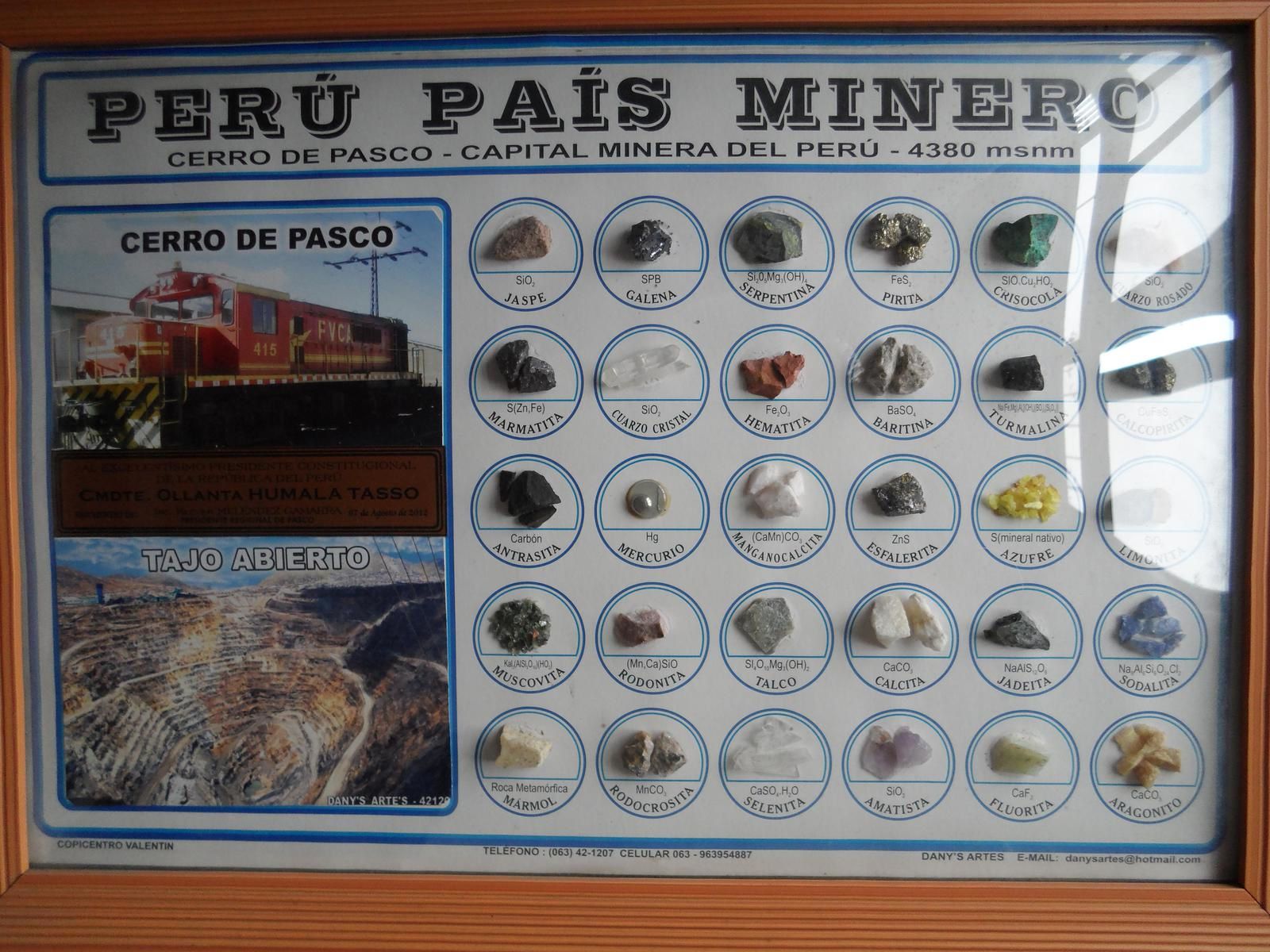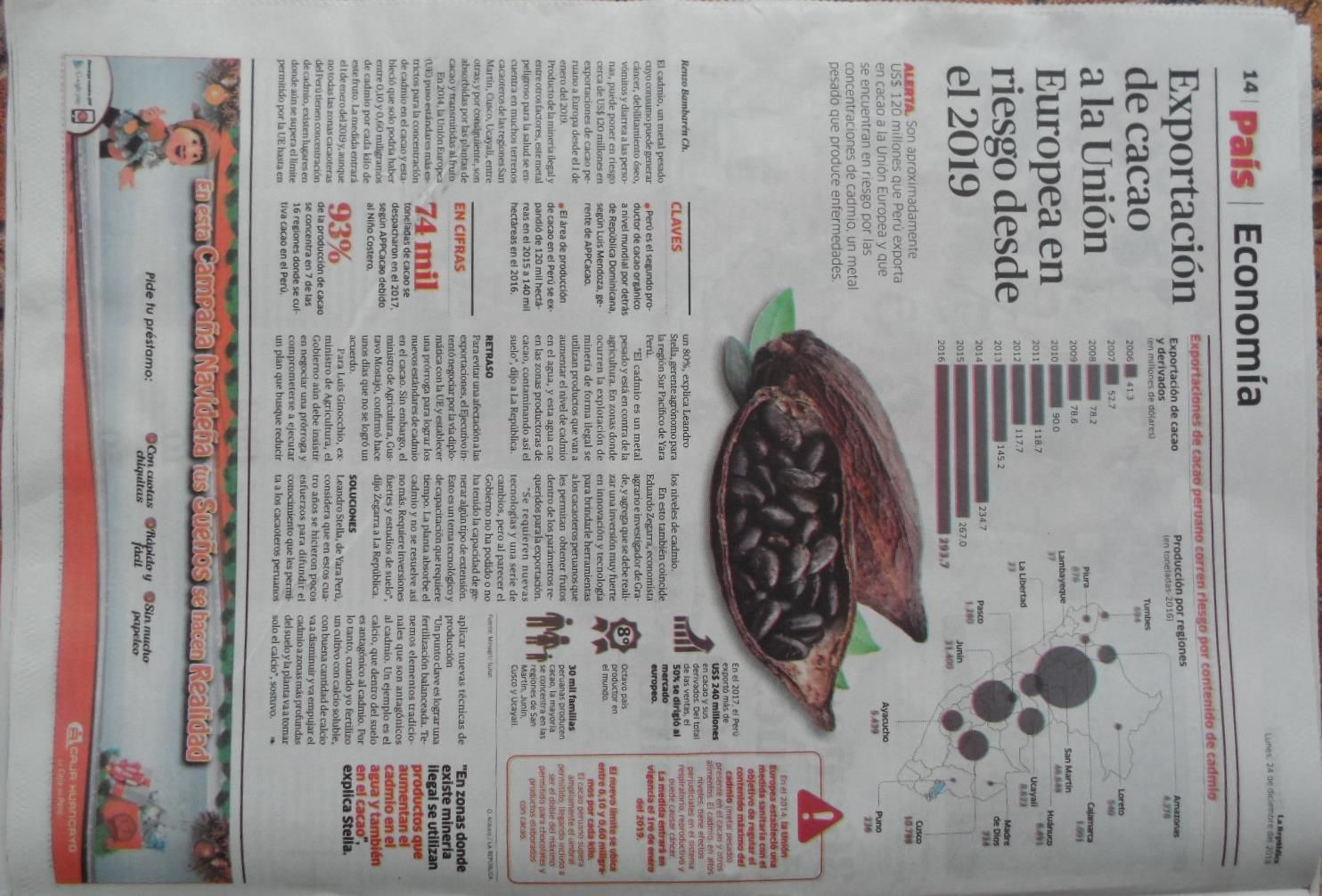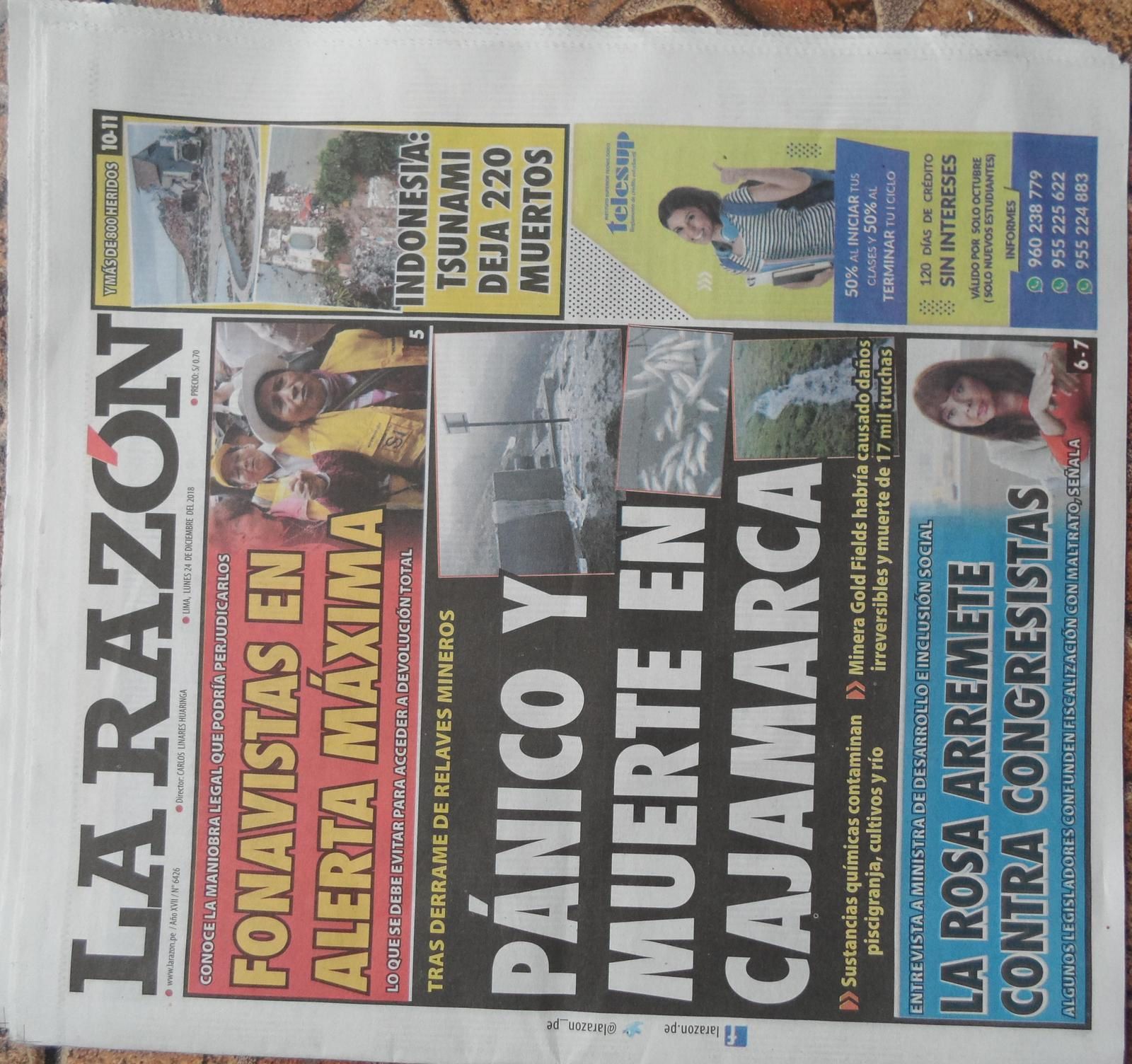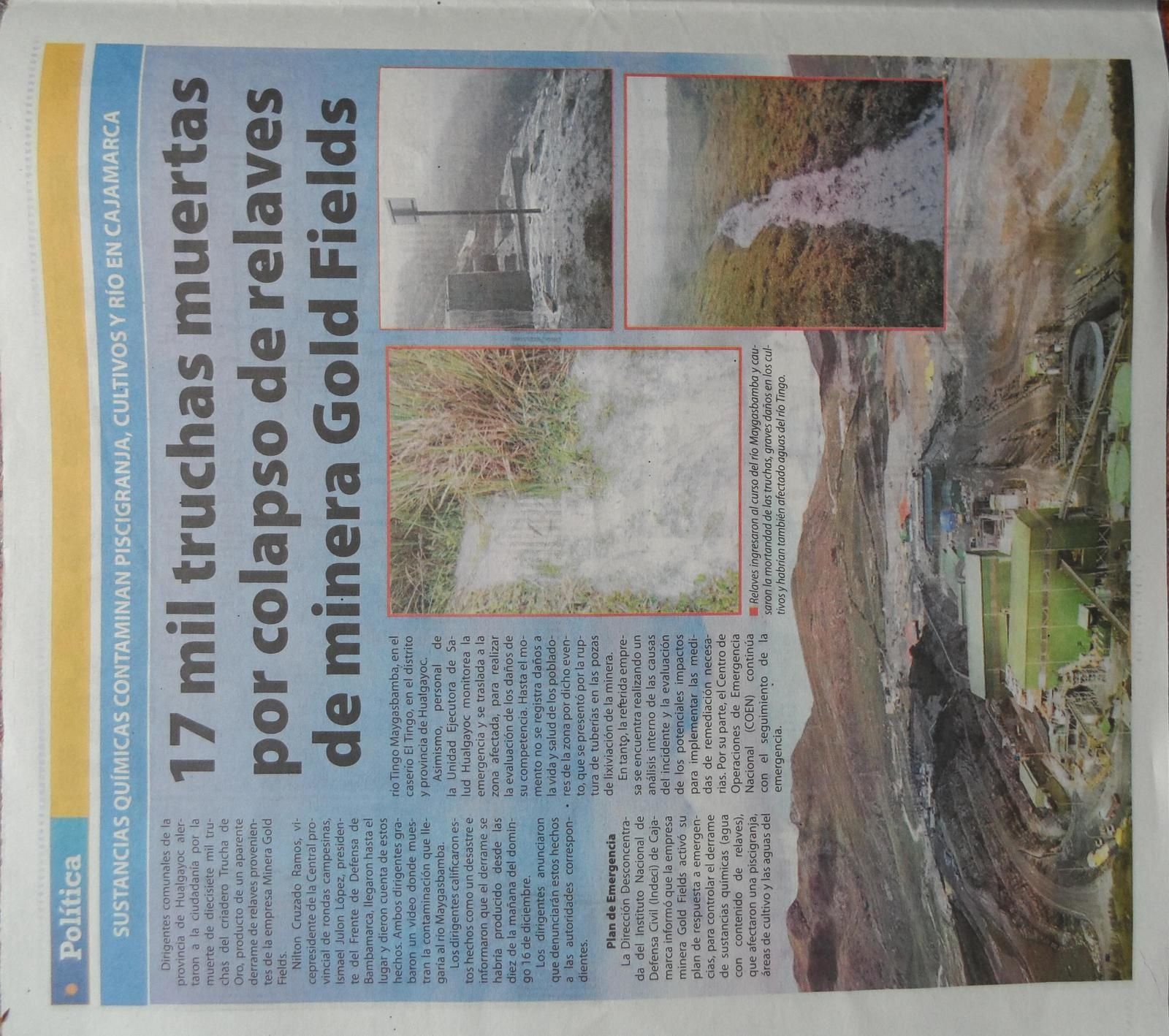WE NEED TO DIVERSIFY THE ECONOMY’: David Hill interview with peruvian mining activist Javier Jahncke from the Red Muqui
‘WE NEED TO DIVERSIFY THE ECONOMY’: INTERVIEW WITH PERUVIAN MINING ACTIVIST
Earlier this year I spoke at length with well-known activist Javier Jahncke from the Red Muqui, a Lima-based network of 29 civil society organisations in Peru. The starting-point of our conversation was a report written for Muqui by researchers from the Humboldt University of Berlin in Germany, which is titled ‘Alternativas de Desarrollo en Regiones Mineras de Perú’ and attempts to identify concrete ways in which Peru can diversify its economy away from mining to more sustainable economic activities such as family-based organic agriculture. Here are 25 excerpts from what Jahncke told me:
1 On why the Humboldt report is important
‘The report is important because it generates a debate about the need to think of economic activities [other than mining] to provide greater stability to our economy. Peru is very dependent on extractives - on mining, oil and gas. Our concern is to ensure that the issue of diversification is discussed at the level of the Peruvian government. What is needed is a political decision to diversify.’
2 On lobbying the government about the Humboldt report
‘Our lobbying work has involved all levels of government, including the Ministry of Energy and Mines, the Ministry of Agriculture and the Ministry of Environment, as well as the Presidential Council of Ministers. They are informed of our proposals. In fact, we have presented the report in Congress in an event there. What we didn’t want is for the report to remain, as they say, in some bookcase.’
3 On government priorities in recent decades
‘Unfortunately the political decisions taken by the government over the last 20 years and more have been to prioritise maintaining a series of legal frameworks favourable to mining, oil and gas, rather than encourage ways of improving other economic activities such as agriculture and cattle-rearing. Just 7% of our national territory is dedicated to farming and cattle-rearing which supply families’ basic needs. And that 7% isn’t protected. It has been conceded to other economic activities like mining.’
4 On the pressure from extractive industries
‘At the moment 15% more or less [of Peru] has been conceded to mining. It has been 25% in the past. Add to that the areas in the Amazon conceded to oil and gas activities and you can see that the pressure on our national territory is intense. Hence the importance of initiating a debate about other options. What are the other economic activities already being carried out? It’s not that we’re trying to identify something unrealistic. There are other economic activities already being carried out in our country that are important and contribute to the local and national economy, but receive no support from the government. We need a political decision to support these activities, in order to improve them and generate other forms of income and improve quality of life. At present only extractivism is seen as the axis of our economy.’
5 On mining’s contribution to climate change
‘I don’t think that [the average person in Europe understands the impacts that mining has] because they’re not informed. I think that if they were more informed, we would see more awareness not just about the impacts on us [in Peru], but on the world in general. We have a serious problem with climate change. And mining does impact climate change. Why do I mention that? Because most of the time it isn’t acknowledged. The connection isn’t made. What’s the main impact? On the change of soil use.’
6 On Peru’s worst-hit mining zone
‘I’d say that the region which exemplifies the impact of mining in Peru in all its ‘splendor’ is Cerro de Pasco. It’s depressing. The impacts are brutal. The city has grown around an open-pit mine. There is a waste-pit right in the middle of it. It used to be a lake that the local population used for water. There is another waste-pit, on the way out of the city, where many children are seriously contaminated by heavy metals. There are people living there. They drink that water. You go to the tap and the water comes out yellow. And it comes out only at certain times of the day. Hardest of all is when they’re doing the exploitation. When they explode the dynamite, the city shakes and the houses split.’
7 On mining’s general environmental impacts
‘Who is assuming responsibility for the environmental impacts - for what has been misleadingly called, by economists, the ‘externalities’? For remediation? The Peruvian government? That’s to say, it is us Peruvians who must pay the price of the impacts caused by mining? Who’s going to cure the children contaminated by lead? With pleasure we at Muqui can contribute, but is it our responsibility? Isn’t it the responsibility of the companies? This [the environmental impacts] is the big problem that mining is leaving us. Muqui was established 15 years ago and in those 15 years we’ve seen how mining has degraded our country in many ways. The contribution it makes to Peru is minimum. Who are the people who really benefit?’
8 On how environmental laws are being weakened to favour mining
‘The legal frameworks are being modified to facilitate access to land and lower standards so that investment continues, so there is less pressure from supervision, and so the companies spend less on environmental concerns. Because the mining companies have requested there are fewer standards. We’re talking about ‘tramitology’, de-regulation. And who does all this? The large law firms who work for the mining companies and exercise considerable power in the government. This must be said: there are company employees who obtain jobs inside the state, change the legal frameworks, present new ones, approve environmental impact assessments (EIAs), and then return to work for the companies. What we call the ‘revolving door.’ That is corruption.’
9 On the way EIAs for mining projects are written
‘Who establishes the project’s ‘zone of influence’, that’s to say, the area to be impacted in the EIAs? The sub-contractor contracted by the mining company. But is the sub-contractor going to tell the company what really will be impacted? That’s the problem. The ‘zone of influence’ is effectively established by the company itself. Not the government. And there is no mechanism that allows the local population, from the beginning, to participate and know what will happen, what consequences there will be. . . First we must evaluate whether EIAs even serve a purpose. And if EIAs continue to be used, then the local population must be able to actively participate in them. It’s the government itself that should be overseeing this. The government itself must assume that responsibility.’
10 On the way EIAs for mining projects are approved
‘No one’s checking the EIAs [before they’re approved]. They’re just something on paper. At the very least, the EIAs must be checked before they’re approved. At the moment it’s just something on paper that the sub-contractor presents. The document for Tía María was 17,000 pages. How much time do you have to review it? Can an engineer review 17,000 pages in 120 days? You have 120 days to evaluate an EIA. No one goes into the field to see if what it says is true. No one goes to see before approving it. Only after it has been approved is there any oversight. What is needed is a strong environmental institution with sufficient resources and personnel who have oversight from the beginning.’
11 On ‘prior consultation’
‘In Peru it’s said that our prior consultation process is an example of how to do it, but it’s a disaster. Other countries are following us. We’re exporting our legal frameworks as if they were examples, but really prior consultation here is an example of how things shouldn’t be done. Well, for the businessmen it’s how things should be done! It’s an example to them. But it’s not how things should be done in terms of respecting rights and guaranteeing due process.’
12 On how communities and organisations come to protest mining
‘They come to Lima, visit the various institutions, present their problems and suggest their solutions. However, no solutions are found. Sometimes there is dialogue. [In the end] there is no way-out and so they come out onto the streets - driven to it by the government’s failure to provide concrete responses to solve their problems. They block roads. It’s to create pressure so that they’re heard, so that they’re attended to. It’s only then, when they’re out on the streets, where there are protests, when there is pressure, when there is confrontation, when there is a crisis, that the government gets involved and sets up a dialogue process [‘mesa de diálogo’]. And what is its function? In reality it’s to say, ‘Let’s sign an agreement: you’ll stop protesting and we’ll comply [with something you’re asking for]. . .’ but they never comply. There’s no one to guarantee that these agreements are ever complied with. So they start protesting again, and then there’s another confrontation. . .’
13 On the criminalisation of protest against mining
‘Community leaders are persecuted. New criminal legal concepts are created. In Tía María, which has become known worldwide, a policeman, after detaining someone, put a ‘púa’ [a kind of tyre spike] in his hand in order to say, ‘Look, a púa, to leave on the ground to burst a car’s tyres.’ So they can say, ‘Here, look, a crime. . .’ but in a video released later you can see that it was a policeman who put the púa in the man’s hand. This is the level of police action we’re faced with - police which have signed agreements with some of the mining companies to provide security.’
14 On accusations of being ‘anti-mining’ and ‘anti-development’
‘There’s a need to discredit us - to claim that what we’re saying is ideological, that we have personal interests, that we’re against mining because we want to obtain some kind of benefit for ourselves. [We’ve presented] a complaint against the journalist Cecilia Valenzuela, who is very well-known in Peru and writes for El Comercio, [because] she wrote in an article [about Tía María] that we were financing various people and that was what promoted the violence in the region. Without any kind of proof at all. . . We’re not against mining. There can be mining wherever if local people agree, if they can participate and be consulted, if it doesn’t impact the environment. But local people are often not in agreement if the environmental impacts are serious.’
15 On accusations of being a ‘terrorist’
‘It was together with 35 other people. We were accused of terrorism after carrying out a consultation [connected to operations by] Río Blanco [a company operating a copper mine in northern Peru] which, at the time, in 2007, was UK-based. Now it’s China. The accusation was made by an association established by members of a local community, and which used the community’s name although it wasn’t really from the community. They themselves said, when they were summoned by the judge to testify, that they were supported by Congresspeople, members of Señora K’s [Keiko Fujimori] party, and from the company itself, Río Blanco.’
16 On Peruvian media coverage of mining
‘It doesn’t help. Speaking generally. Much of the media are financed by mining, oil and gas activities. There’s a saying here: ‘The dog doesn’t bite the hand that feeds it.’ It’s very difficult for the media to say anything in opposition.’
17 On the origins of the most influential companies in Peruvian mining
‘There are companies from many different countries, but the one which has increased [most recently] is clearly China. But then there is Yanacocha from the US, and Antamina which has Canadian capital. From South Africa there is Anglo-Gold. From Australia: BHP. From Switzerland: Glencore.’
18 On the responsibility of other countries’ governments
‘The number of important companies [operating in Peru] raises the issue of the responsibility of the governments of those companies’ countries of origin. Those governments don’t have mechanisms to ensure that their companies are complying with international laws and standards. What we’re calling for, at the very least, is that companies comply with the same standards that apply in their home countries. In Peru the standards are minimum. They’re lax in order to favour investment.’
19 On the involvement and responsibility of consumers in other countries
‘[The Humboldt researchers] were very interested in addressing this issue because fundamentally it is about the economic model we have in this country, focused on mining. That is important in Europe because the question is this: up until what point will demand for raw materials from Europe and other industrialised countries continue? It is because of that demand that we’re living like this now, with this pressure from mining, oil and gas activities on our territories - especially the territories of indigenous peoples in the Andes and Amazon - which is affecting their rights and threatening their future existence.’
20 On Peru violating a trade deal with the European Union
‘We’ve been part of a complaint presented to the EU last year, in October, regarding the government’s failure to comply with the Trade Agreement it has with the EU. Peru hasn’t benefitted because of the way the agreement was negotiated, but we think that it is an important mechanism enabling us to demand that the government comply with the legal frameworks on labour issues, the environment and land in a way that respects the rights of communities and social organisations, their economic activities and their lives. This is also part of the process to protect these other economic activities and promote diversification.’
21 On ‘development’ and how rural communities are perceived
‘They’re not considered ‘developed’, as is said in Peru. Because people talk of ‘development’ and the need to ‘include’ them! No, you’ve got to ‘insert’ them into development! The question is: who has asked those communities if they want to be ‘inserted’ into the idea of development that you living in the city have? Wouldn’t it be appropriate instead to support them to improve their quality of life, their levels of production and their culture, which in turn will provide food security, economic benefits and organic products, which people can consume instead of industrialised products impacting their health? Wouldn’t that be better? Hence wouldn’t it be better to diversify the economy and support them with other economic activities? It’s important to remember that there are other ways to live that are different to those of us who have westernised, and that those ways of life should be respected and provide an example for the future. Sometimes we need to think a little harder, when we talk of ‘development’, about those communities taking care of our ecosystems, the regions where the rivers birth, and the areas that provide our food.’
22 On how mining has created dependency
‘Everything has been done to create a dependency on mining. It shouldn’t be that there are people in, say, La Oroya [in the Junín region] who come out onto the streets in favour of the company to demand that the Metallurgical Complex there keeps operating when their children are dying from contaminated water. This is an example of the dependency. People in La Oroya want the Complex to keep operating in order to earn an income because there is no other economic activity in the region.’
23 On the future if things remain the same
‘Lack of water will be an issue. Because the rivers are being diverted to other areas, for mining, for other economic activities. The water is being contaminated. We’ll have to look for new sources when in 50 years or so we won’t have any glaciers because of climate change. So where will we get our water from? It’s going to be a serious problem. We’ll have to get it from the Amazon. And how will the Amazon be in 50 years or so, following the impacts of the oil industry and all the spills?’
24 On why Muqui shouldn’t really exist
‘The government is failing to guarantee peoples’ rights. Institutions like ours shouldn’t exist if the government was doing so.’
25 On how Peru is really an agricultural country - and what that could mean for the future
‘This narrative of ‘Peru: a mining country’ [‘Perú: país minero’] is one imposed on us by the mining companies. Peru is, historically speaking, an agricultural country. It always has been. We’re not saying mining doesn’t have a role. It’s had an important role, but it shouldn’t be that it’s the only economic activity. Rather, let’s promote Peru as the agricultural country that it has been historically, with mining playing a role. That’s why we need to diversify. And that’s why now is the time to discuss how to do it.’

/image%2F0662944%2F20170313%2Fob_3490fc_poc-grands-reportages-nov-99.jpg)







/image%2F0662944%2F20240423%2Fob_f40bbf_dr-ali-shariati.jpg)
/https%3A%2F%2Fi.ytimg.com%2Fvi%2FIyvqfh2wupA%2Fhqdefault.jpg)
/image%2F0662944%2F20240420%2Fob_bee88f_image-0662944-20230612-ob-324e2d-imrar.png)
/image%2F0662944%2F20240418%2Fob_83ffe9_pcr.png)
